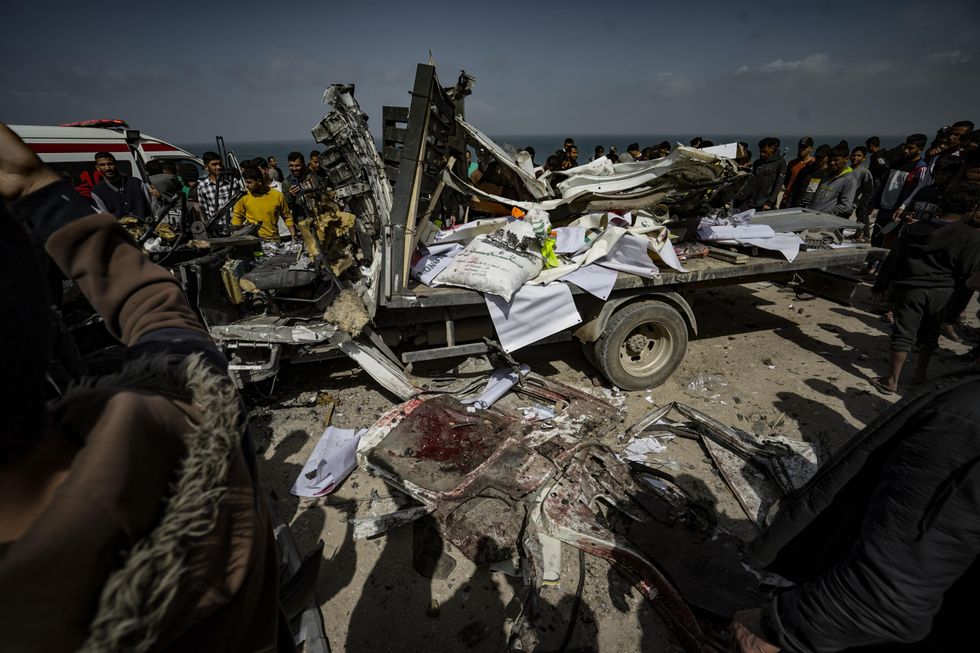The U.S. military on Saturday executed the first of what's expected to be a series of humanitarian aid airdrops into the Gaza Strip, parachuting packages containing 38,000 meals to the besieged enclave's coastline as the territory's entire population—roughly 2.2 million people—faces the
imminent threat of starvation due to Israel's ongoing assault and blockade.
The airdrop, coordinated with the Jordanian military, came days after Israeli forces
opened fire on a crowd of desperate Gazans near a convoy of aid trucks in the northern part of the territory, which Israel has almost completely cut off from humanitarian assistance.
The incident, dubbed the "flour massacre," was just one of
more than a dozen documented cases this year of the U.S.-armed Israeli military attacking Gazans gathering to receive food aid and other assistance, according to the United Nations.
Biden administration officials
said Saturday that "the aid flowing into Gaza is nowhere near enough and nowhere near fast enough," but the White House has done nothing to force the Israeli government to stop obstructing ground-based deliveries, which have fallen in recent weeks and become virtually impossible in much of the territory because of Israel's restrictions and repeated attacks on aid workers.
Administration officials have dismissed calls to attach conditions to U.S. military assistance to Israel, which has
used American weaponry to commit atrocities in the Gaza Strip. The administration is currently preparing to send Israel additional bombs and other weaponry.
"Biden is airdropping food (expensive, inefficient, potentially dangerous) because he won't condition massive U.S. military aid and arms sales on Israel ending its obstruction of most ground aid deliveries,"
said Kenneth Roth, former executive director of Human Rights Watch.
On Sunday, following the U.S. airdrop, Israeli forces were accused of striking an aid vehicle in central Gaza, reportedly killing eight people.
 (Photo: Belal Khaled/Anadolu via Getty Images)
(Photo: Belal Khaled/Anadolu via Getty Images)
At least 15 children in Gaza have died from starvation or dehydration in recent days,
according to the Al-Mezan Center for Human Rights.
A top World Food Program official
warned last week that "food aid is required by almost the entire population of 2.2 million people" and that Gaza is "seeing the worst level of child malnutrition anywhere in the world." The U.N. special rapporteur on the right to food, Michael Fakhri, said Israel is deliberately starving Gaza's population, a blatant war crime.
In the face of such a large-scale emergency, critics said the Biden administration's airdrops are nowhere near sufficient.
"Instead of dropping packages from the sky—some of which end up in the sea or outside of Gaza and which the most vulnerable cannot reach in any case—the U.S., the U.K., and others should ensure that Israel immediately opens all crossings into Gaza for aid and aid workers to assist those in need,"
said Melanie Ward, CEO of Medical Aid for Palestinians.
"This includes the Karni and Erez crossings, which give direct access to the north of Gaza," Ward continued. "Only safe and unfettered access for aid and aid workers, the lifting of the siege, and an immediate cease-fire can end starvation in Gaza."
Dave Harden, a former assistant administrator at the United States Agency for International Development,
said in an interview Saturday that airdrops are "inefficient, expensive, and risky."
"Airdropping from 30,000 feet is simply not the solution," said Harden. "And, by the way, it's a little offensive to the United States, too. I mean, Israel is our ally and we're supporting them in a very substantial and meaningful way. And for us not to be able to get aid in to innocent civilians in Gaza is really an indictment both on the Biden administration and the Bibi Netanyahu administration."

 (Photo: Belal Khaled/Anadolu via Getty Images)
(Photo: Belal Khaled/Anadolu via Getty Images)